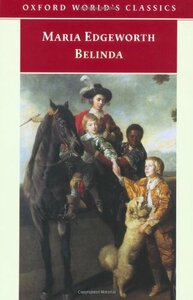You need to sign in or sign up before continuing.
Take a photo of a barcode or cover
I was hoping this work would be more entertaining like Burney's Evelina which was highly entertaining and funny, this was a very slow go with some really lengthy conversations between characters. When I got to the end of the work it just was okay, that was predictable. For those who love this story I am indeed sorry, it just didn't cut it for me.
challenging
dark
emotional
inspiring
slow-paced
Plot or Character Driven:
A mix
Strong character development:
Yes
Loveable characters:
Complicated
Diverse cast of characters:
Complicated
Flaws of characters a main focus:
Yes
lighthearted
reflective
slow-paced
Plot or Character Driven:
Character
Strong character development:
Yes
Loveable characters:
Yes
Diverse cast of characters:
No
Flaws of characters a main focus:
Yes
The book should be titled: Belinda's Choice. Let's see, should she go with the wealthy, handsome young man who has been fun-loving and spontaneous in his youth but is ready to settle down? The only problem with this one is he likes to find beautiful young women and then sequester them away for his own delight, grooming them to be the perfect wife- just a tad creepy. (Really!! What is it with men and their penchant for imprisoning and isolating women for their eyes only. Gah! I will never understand the need of men to "own" women.) Or with the other wealthy, handsome young men who is also impetuous and spontaneous but loves to have serious discussions but does not seem quite ready to settle down. Oh and he also has a gambling addiction. You will have to read the book to find out whom she chooses.
Belinda also befriends and redeems a lady who then becomes her best friend. Lady Delacour is a lady of fashion and before she meets Belinda was involved in a number of scandals (including a female duel!) and was estranged from her husband and her daughter. Through the good influence of Belinda, Lady Delacour succumbs to a peaceful domestic life, gives up her "fashionable" ways and is reconciled with her husband and daughter. The story of Lady Delacour is at the center of the novel and is the tale of morality on the dangers of gossip, fashion, and dissipation. Belinda is the moral center of the novel who never wavers in her principles and good sense.
This is my second pre-Austen novels, the first being Evelina by Fanny Burney, and I ultimately enjoyed the book. At first it was a little slow as it focused on the adventures of Lady Delacour and her fashionable life, but then the love story emerges mid way and composes the remainder of the novel. The book ends with the saying that this is morality tale, but only the reader can find the moral principle within. And the book is a moral tale with a slightly feminist bent. While Edgeworth suggests that domestic bliss is more peaceful and satisfactory than one of fashion in the public eye, her exemplary female characters are ones who are well-read, intelligent, and excellent conversationalists. While the goal of women is to marry well, she also recommends that husbands find wives that are their intellectual equals and for women to marry for love and companionship and not for wealth.
Edgeworth is no Jane Austen, but this is still a fun tale of love and redmption.
Belinda also befriends and redeems a lady who then becomes her best friend. Lady Delacour is a lady of fashion and before she meets Belinda was involved in a number of scandals (including a female duel!) and was estranged from her husband and her daughter. Through the good influence of Belinda, Lady Delacour succumbs to a peaceful domestic life, gives up her "fashionable" ways and is reconciled with her husband and daughter. The story of Lady Delacour is at the center of the novel and is the tale of morality on the dangers of gossip, fashion, and dissipation. Belinda is the moral center of the novel who never wavers in her principles and good sense.
This is my second pre-Austen novels, the first being Evelina by Fanny Burney, and I ultimately enjoyed the book. At first it was a little slow as it focused on the adventures of Lady Delacour and her fashionable life, but then the love story emerges mid way and composes the remainder of the novel. The book ends with the saying that this is morality tale, but only the reader can find the moral principle within. And the book is a moral tale with a slightly feminist bent. While Edgeworth suggests that domestic bliss is more peaceful and satisfactory than one of fashion in the public eye, her exemplary female characters are ones who are well-read, intelligent, and excellent conversationalists. While the goal of women is to marry well, she also recommends that husbands find wives that are their intellectual equals and for women to marry for love and companionship and not for wealth.
Edgeworth is no Jane Austen, but this is still a fun tale of love and redmption.
La escritora Maria Edgeworth fue una de las autoras predilectas de Jane Austen y gozó de un enorme éxito como ensayista y novelista a finales del XVIII y principios del XIX.
Fue una autora muy implicada en temas sociales como el racismo, las hambrunas y la educación de la mujer y sus libros tenían siempre una finalidad educativa.
Belinda es la última sobrina casadera de la señora Stanhope que quiere asegurarle las mejores oportunidades en la búsqueda de un matrimonio ventajoso.
Para ello, la enviará a vivir en compañía de lady Delacour, la personalidad más fascinante e influyente de la sociedad londinense.
La joven se ve sumergida de repente en un mundo deslumbrante de lujo y opulencia tras el que se esconden tragedias, secretos y desencantos.
Conocerá al apuesto Clarence Harvey y sufrirá en sus propias carnes el escarnio que provoca la desmedida ambición de su tía.
Novela de aprendizaje y descubrimiento, Belinda deberá tomar sus propias decisiones y encontrar su lugar en el mundo.
Una obra fascinante, anclada en el uso moral propio del siglo XVIII, pero que provocó polémica por incluir, por ejemplo, un matrimonio interracial inédito en la literatura de la época.
La hemos leído, disfrutado y debatido en las #lecturasconjuntasraquellectora con el extra añadido de contar con su fantástica traductora @noemijfurquet en la última tertulia, donde respondió muchísimas preguntas y dudas
Belinda, 1801
Maria Edgeworth
@librosdesedaeditorial 2021
Traducción de Noemí Jiménez Furquet
#belinda #mariaedgeworth #leoclásicos #leoautoras
Fue una autora muy implicada en temas sociales como el racismo, las hambrunas y la educación de la mujer y sus libros tenían siempre una finalidad educativa.
Belinda es la última sobrina casadera de la señora Stanhope que quiere asegurarle las mejores oportunidades en la búsqueda de un matrimonio ventajoso.
Para ello, la enviará a vivir en compañía de lady Delacour, la personalidad más fascinante e influyente de la sociedad londinense.
La joven se ve sumergida de repente en un mundo deslumbrante de lujo y opulencia tras el que se esconden tragedias, secretos y desencantos.
Conocerá al apuesto Clarence Harvey y sufrirá en sus propias carnes el escarnio que provoca la desmedida ambición de su tía.
Novela de aprendizaje y descubrimiento, Belinda deberá tomar sus propias decisiones y encontrar su lugar en el mundo.
Una obra fascinante, anclada en el uso moral propio del siglo XVIII, pero que provocó polémica por incluir, por ejemplo, un matrimonio interracial inédito en la literatura de la época.
La hemos leído, disfrutado y debatido en las #lecturasconjuntasraquellectora con el extra añadido de contar con su fantástica traductora @noemijfurquet en la última tertulia, donde respondió muchísimas preguntas y dudas
Belinda, 1801
Maria Edgeworth
@librosdesedaeditorial 2021
Traducción de Noemí Jiménez Furquet
#belinda #mariaedgeworth #leoclásicos #leoautoras
Another great read from my Feminist Enlightenment class.
adventurous
emotional
funny
mysterious
slow-paced
Plot or Character Driven:
A mix
Strong character development:
Yes
Loveable characters:
Complicated
Diverse cast of characters:
No
Flaws of characters a main focus:
No
What signifies being happy, unless we appear so?
I enjoyed this a lot more than I was expecting, it takes a lot of inspiration from Evelina, or at least they seem to be built on the same template, but I actually thought that the twists and turns and various mysteries were very fun and engaging. I was extremely invested in what was going to happen with Clarence and Belinda. I also thought the ending was astonishingly modern, very meta and almost satirical. A quite enjoyable read, feels very fresh despite its age.
My dear Belinda, if you will not quarrel with the quality, you may have what quantity of praise you please.This, to put it plainly, was a mess. Reading it was akin to following a long, arduous, and convoluted Twitter drama where all is told and nothing is shown, and the emotional payout isn't slow burn but an exasperating "Finally!" to the resolution between a personality-less paragon and a supremely creepy patriarchal ideal. It's infuriating that this edition is the heavily censored 1811 version, which cuts out all mention of interracial marriages, both fulfilled and potential, because I don't see myself deigning to go through this narrative again just for the sake of seeing how far the rot of Edgeworth's father spread. Thus, I may never be able to legitimately judge this, and it's an added shame that I had to discover the particulars of this censorship not from this work's introduction, but Wikipedia of all places. All in all, my reading of this did not occur at all in a satisfactory fashion, so all I can hope is that thirty or forty years hence, I settle down with an edition of the 1801 version with far more footnotes and/or extant material to its name. I don't expect to like the story any better, but I'll at least understand the context far more than I do so at present.
'Why will you delight in making yourself less good than you are, my dear Lady Delacour?' said Belinda, taking her hand.This narrative was little more than a rapid fire compilation of explanations, enunciations, and long winded flashbacks into the justifications of every decision ever made and every character trait ever developed. The beginning could have gone either way in terms of quality, but once the plot started sagging down in a heap of moral self-righteousness, I knew that the narrative was doomed to continue down similar lines until everyone left was a je ne sais quois piece of perfection and everyone not had been packed off to either a foreign country or some other undisclosed obscurity. There were superbly brief gems of insight here and there, and I can well imagine Austen being influenced by this, especially by a certain part for her construction of [b:Persuasion|2156|Persuasion|Jane Austen|https://images.gr-assets.com/books/1385172413s/2156.jpg|2534720], but Anglo literature written by women has come a long way since 1801, and a mere decade or so resulted in examples that, to this day, are world's away from 'Belinda' in terms of balancing finely tuned emotional sense, narrative engagement, and truly profound development of theme and character./ As I said in my review of [b:Charlotte Temple|597694|Charlotte Temple|Susanna Rowson|https://images.gr-assets.com/books/1437906739s/597694.jpg|584326], I don't expect to love or even like all of the old stuff I read for the sake of demographical expansion, but the reception of this work today isn't helped at all by the environment the author worked in, and I do have to say that I am rather curious, per the introduction's discussion, about [b:Castle Rackrent|251290|Castle Rackrent|Maria Edgeworth|https://images.gr-assets.com/books/1405624541s/251290.jpg|898743], which supposedly has the complicated character of Lady Delacour and co. with little, if any, of the morbidly dull redemption story.
'Because I hate to be like other people' said her ladyship, 'who delight in making themselves appear better than they are.[']
Those who persecute, to overturn religion, can scarcely pretend to more philosophy, or more liberality, than those who persecute to support it[.]The day of writing this review has been exceedingly stressful, and unfortunately, I typed this up before I got any closure on various pending issues in my life. As of now, I can only think that it's obscene how much lit by women has been compromised by domineering social forces, and much like the denial that keeps white-washing Heathcliff, artificial constricting of writing allows bigotry to inflate itself in historical representation beyond all bounds of what reality truly consisted of way back when. One probably can't chalk up the horrid antisemitism of a chapter just near the end to anyone other than Edgeworth herself, but the blatant manipulation of the 1801 text still stands and certainly didn't help. In fact, one can still see evidence of the hastily erased racial marriage (unless I missed a cue or two), which goes to show that bigotry couldn't even do its hateful job properly. Ah well. An unusual artifact from more than two centuries ago, and probably controversial enough to merit a more serious evaluation on a broader scale of media than has so far been afforded it.
'But possibly these are only truths for ladies. Doctor X— may be such an ungallant philosopher, as to think some truths are not fit for ladies. He may hold a different language with gentlemen.'
'I should not only be an ungallant but a weak philosopher,' said Dr X—, 'if I thought that truth was not the same for all the world who can understand.[']
Thoroughly enjoyed the book. It was part of the reading I assigned myself during my dissertation, and rereading it for pleasure was worth it. I high recommend if you enjoy books of the enlightenment or romanticism eras.
This book has everything you would hope for and more -- dissipated women, secret mistresses, not-so-secret mistresses, duels, cross dressing, unspecified wasting diseases, opium, reunions that strain credulity, and so on. Unfortunately, it also has some of the things one has come to expect of novels from the time -- anti-Semitic portraits of money lenders and shadowy business dealings in slave trade and colonization. And at the same time spirited meditations on the lives of women and their rights.






